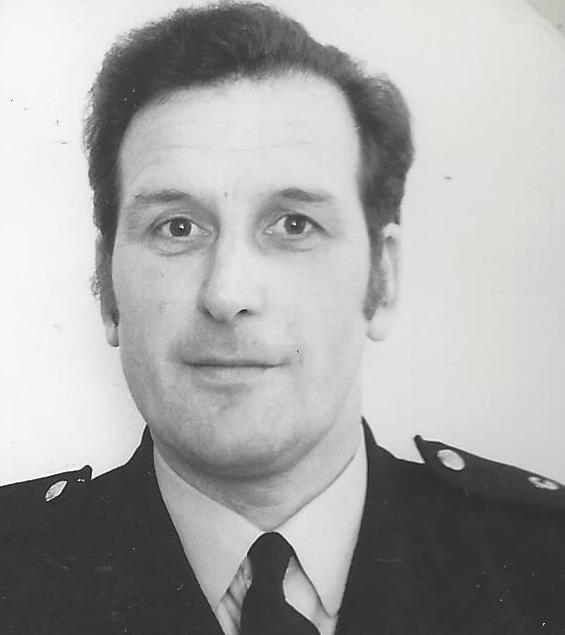
Evans RC 370
(Gloucestershire Police Archives URN 7218)
Ron Evans joined Gloucestershire Constabulary in November 1957.

During that time policing was very different and he has been talking to his friend Elaine about his time with Gloucestershire Constabulary.
I joined Gloucestershire Constabulary in 1957. My career as a police officer came about by chance. My father’s family were farmers and I always imagined that I would follow in their footsteps. After gaining my School Certificate I studied at the Henry Ford Institute of Agricultural Engineering in Essex. When I returned home to the village of Uley in Gloucestershire one year later I was hoping to find work on a big progressive farm. I applied for lots of jobs but nothing came of my efforts. As time went by I settled into helping my father on the farm. Though I enjoyed life on the land there was little money to be had from farming.
I was out one day when a police motorcyclist chugged up to me. It was Bernard Sprason, a lad I went to school with. He was originally an evacuee from Birmingham during the war who was taken in and semi-adopted by Mrs Bray of Owlpen Manor, Uley. We chatted and he persuaded me to apply to Gloucestershire Constabulary: “It’s not a bad lark, you should try it” he said. I filled in forms, took some tests and had a medical examination. I was interviewed by the Assistant Chief Constable Herbert Smith, offered a job and so began my career.
Cadet Training at Chantmarle Manor
In those days you had to attend a seven week cadet training course at Chantmarle Manor, a beautiful Grade 1 listed building down in Dorset. I used to travel back home to my wife in Gloucestershire at weekends on my motorcycle but I wasn’t able to do this every weekend because it was too expensive. As cadets we had to learn about the law and police procedures. We were each issued with a yellow booklet ‘Useful definitions for Police Officers’ that explained terms such as assault and battery, and the words to be used when giving a formal caution. I used to walk around the manor gardens with my booklet, reciting the definitions hoping I could commit them to memory as I knew we’d be tested on them later.
After Chantmarle I had to attend a one week Local Procedure course at the Constabulary’s Training Department, a big wooden building situated at the back of Police HQ in Cheltenham. In those days every police constable was a Coroner’s officer. You had to report sudden deaths to the Coroner and attend the post mortems as well. At some stage during the week all of the class was sent to observe a post mortem. Two of the men actually fainted. It was never a nice experience attending a post mortem though perhaps it was slightly easier for me due to my farming background.
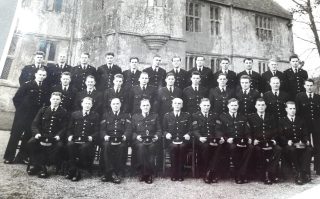
Course photograph thought to be February 1958. Ron Evans is 5th from right. Other Gloucestershire officers thought to be in photograph include Brian Hicks, Robert Davies, John Pearce and Mike Biddell.
(Gloucestershire Police Archives URN 10984)
Stroud Police Station – 1957 to 1959
I was on the beat as a probationer for 2 years at Stroud which I enjoyed as I’ve always liked being in contact with people. As a probationer your progress was continually monitored. You lived on a bit of a knife edge: they could get rid of you at any time without having to give you a reason why. They’d just say that you were unsuitable to be a police constable. It happened to a few people I knew.
We worked 8 hour shifts on a rotating pattern. You’d get a 45 minute meal break during the shift. I’d bring in my own sandwiches and there was a kitchen at the station where you could make a fresh cup of tea. When you were out on the beat there were one or two places you could nip in for a cup of tea but you had to be quick about it, no more than 10 minutes.
The station office was the domain of Police Constable Lionel Winfield, the Duty Clerk. There weren’t many officers who liked doing paperwork but it suited Lionel, who worked on a permanent 5pm to 1am shift, as it enabled him to care for his disabled wife. Back in the late 1950s everyone drank tea and tea bags were still a bit of a novelty. Lionel used to painstakingly dry wet tea bags around the coke burning stove so that he could use them again.
Chief Inspector Westcott
The old Police station in Stroud was situated next to the Magistrates’ Court. My Chief Inspector, Bill Westcott, lived in a house attached to the court. Bill was a large man with an impressive presence. On Friday and Saturday nights he used to walk the streets with the probationers. One night I was called out to deal with a drunken altercation between two Irish labourers and local men. The locals had chased the two Irishmen up the High Street and into the Shambles. The two men smashed open a shop door and barricaded themselves inside. As I stood in the doorway trying to restore some order things could easily have got out of hand. Suddenly Chief Inspector Westcott appeared from around the corner, cloaked with the full majesty of the law “What’s going on here my dear boy?” he asked. I was never so pleased to see a man in all my life as at that moment.
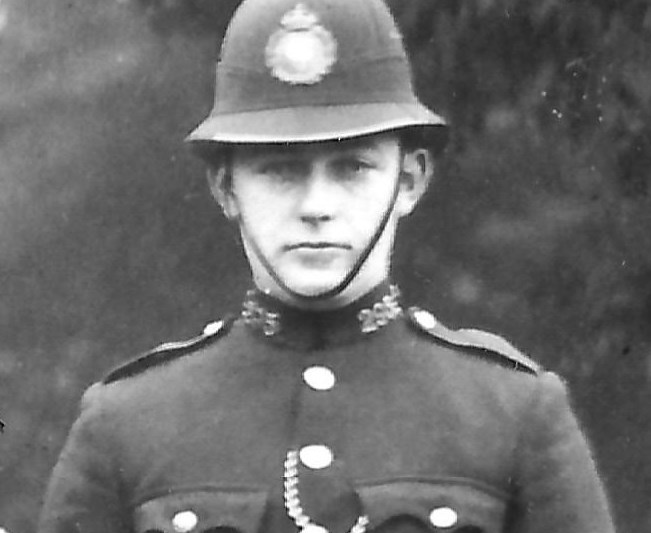
Police Constable 295 William H Westcott.
(Gloucestershire Police Archives URN 9296)
William Wescott joined the Constabulary on 24th April 1926 and rose through the ranks to Chief Inspector. He retired on pension in 1961.
Traffic Duty in Stroud
There were two beats in the centre: Town 1 covering the Lansdown area and Town 2 covering the area around the railway station. Stroud was constantly busy as the A46 passes through the town and there were often traffic problems at the top end of the High Street. Consequently, there were always two policemen on duty in the centre between the hours of 8am and 8pm and this is where I learnt how to direct the traffic manually.
Rowland Cox was a middle aged police officer who lived in the single men’s accommodation above the station. He was a great bloke who took me out on my first traffic duties in the town centre and showed me the ropes.
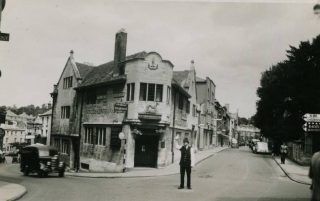
Police Constable Neville Dowson on point duty in Stroud around 1953.
(Gloucestershire Police Archives URN 8163)

When you were controlling the flow of the traffic you had to wear detachable white sleeves in order to be visible to oncoming vehicles, as well as white gloves which we had to launder ourselves. During the shift you’d work one hour on and one hour off, and you’d take the sleeves from the officer you were relieving. When it was a wet day we wore long rubberised macs but the rain used to drip off the mac and pool around your boots. Your feet got very chilled when the weather was cold.
There was a boot allowance that was paid with our wages. I used to wear Dr Martens boots with ¾” air cushioned soles. They looked a bit clumsy but were waterproof and kept your feet warm. It was only later in my career that officers were allowed to wear shoes though there were exemptions for anyone who had a medical problem. Of course, patrol car and divisional van drivers wore shoes because the pedals were more responsive to shoes than boots.
We’d direct the traffic with hand signals and you had to make sure that vehicles didn’t collide. You had to keep your wits about you. There were so many old vehicles on the roads and they weren’t regulated like they are today. Sometimes you’d get a lorry coming up the hill and they got priority because they wouldn’t have been able to hold on the hill.
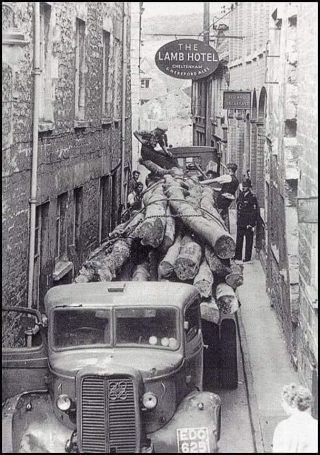
Lorry stuck in Stroud outside the Lamb Hotel.
(Gloucestershire Police Archives URN 10837)
I once recall stopping an elderly lady in her Austin 7 car when she drove the wrong way round the one-way system on the High Street. I suppose it was easy enough to come down the hill and forget that one stretch of the High Street was only open to traffic going up the hill. I explained to her politely that she was going the wrong way. At the time I didn’t realise I was speaking to the Chair of the local Magistrates’ Bench. Afterwards she went to see the station Superintendent, who called me in to his office. She had said that I was doing my job very well. I got a “Well done” from the Superintendent who was pleased that I’d responded to her in a positive manner.
Sergeant Cason (early 1960’s)
My sergeant at Thornbury was Denis Cason and he was a pleasure to work with. Like so many of the older officers I came across, Denis had fought in the Second World War. I believe his father was originally from Norfolk as Denis used to pronounce the word beautiful as ‘bootiful’. I have a memory of a young lad on a bicycle coming towards us with no lights, riding too fast. The sergeant stepped into the road signalled for the lad to stop and when he didn’t immediately do so, Denis got quite cross: “Didn’t you just see me give you a bootiful hand signal?” he spluttered indignantly. I was dying to laugh out loud but of course I kept a straight face.
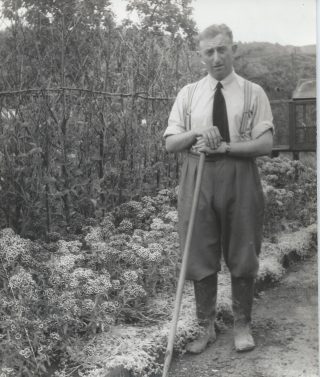
Police Constable Denis Cason in his garden at Parkend posing for a photo when he won the best police garden in Gloucestershire.
(Gloucestershire Police Archives URN 10882)
Lydney shotgun (Ron thinks this was 1974/75)
One evening I was having a cup of tea and a meal break at Lydney police station when they asked for two volunteers to go out and disarm a Tutshill man. He’d had some sort of altercation and was driving around in his car with a shotgun. Of course, everyone in the station just sat and twiddled their thumbs until two married men, myself and a police officer called Taffy Williams volunteered. We stopped an 8 wheeler lorry near Lydney Park and asked the driver if he could put his vehicle across the road, in case the armed man came along that way. He agreed and settled down at the side of the road in anticipation of some action. Eventually a patrol car came along to say that the armed man was found asleep in his car at a layby. Fortunately, the shotgun wasn’t loaded but we didn’t know that at the time we volunteered.
Police Houses
When I completed the initial stages of my training I was sent to Stroud Police Station as a probationer and had to live in the single men’s quarters above the station for two weeks until accommodation was found for myself and my family. At this time the Constabulary rented houses from the Council and we were given an end of terrace council house in Folly Lane. The house was so sub-standard that we used to get fleas come through the skirting boards from the next-door neighbour’s house.
In 1959 when I completed my probation I was posted to Blakeney Station but we were allocated a detached police house at Yorkley. There was actually a small police station in the village that had been downgraded from a two man to a one man station. We lived in the ‘second man’s’ house. I was given a £30 allowance to cover removal costs and to pay for curtains and floor coverings. We had to furnish the house ourselves and my wages at the time were about £15 a week. I always remember that the front door didn’t fit the frame properly and when the wind blew, the lino rose up off the floor! There was a big garden which I dug up and I grew my own vegetables.
From Blakeney I was sent to Thornbury Police Station. The Constabulary had purchased a couple of newly built Wimpey homes at Gillingstool. My family was put in a brand-new 3 bed semi-detached house which we thought was wonderful.
From Thornbury it was back to the Forest of Dean where I was put in charge of Mitcheldean Station. After the comfort of our brand-new Wimpey home, we had a rotten old house to live in. Our front room was actually the station office. Sometimes you’d get drunks coming into our hallway, which I didn’t like as the children were asleep upstairs.
Fortunately, about 18 months into my posting, a new house with a station office attached was built opposite the old one.

Mitcheldean 1965-late 20th century House today
(Gloucestershire Police Archives URN 10880-20)
This was a great improvement. The new house was up on a bank. I managed to get hold of bricks from some cottages that were being demolished and I used them to build two small walls and a terrace at the front of the house.
Eventually, my wife and I managed to buy our first home – an ex-police house at Church Road, Lydney. There were four of them up for sale: two pairs of 3 bed semi-detached houses. I didn’t get any preferential treatment; we had to pay the market price which was £6,850. And I recall being told that if I didn’t make my mind up quickly the property would be re-valued in a month. We had to pay a deposit of £1,000. There was a large garden in which I planted four apple and two pear trees.
A Murder
Elaine said that Ron told her about a murder case. This case involved George Wood who was convicted of murdering his wife Olive at Gloucester Assizes on 9 March 1963 and sentenced to life imprisonment. When Ron was at Thornbury police station he escorted Wood from Horfield Prison Bristol to the Magistrate’s Court at Thornbury (which was above the police station) and back again after Wood was remanded in custody and committed for trial at the Assizes. Ron said that even though 54 year old Wood was handcuffed he was very wary about him as Wood had an aura of menace about him – at the time Ron was a young and fit 6ft tall constable so I found this an interesting observation. I’ve looked up reports of the trial and committal hearing on the British Newspaper Archive and it’s fascinating that Wood said at the end of his trial “What I did was say the truth, the whole truth and nothing but the truth.” Ron did seem to think that Wood might have been a former Special Constable but I couldn’t find any reference to this in the reports I read, so this may not be the case.
After a little research we found the following information

Thornbury Division Pilning Subsection
Back Row: Special Constables Wood, Hardwell, Murray, Pope, Cook, Howse.
Seated: Special Constable Ball, Head Special Constable Fisher, Police Constable Parry, Police War Reserve Osmond, Special Constable Lock.
(Gloucestershire Police Archives URN 6971)
Wood was indeed a special constable during the war, as a farmer he was in a reserved occupation, which mean that he did not have to join the forces.When you look at the photo taken of him during the war despite it being a poor photograph you can see that he is much taller and younger than his colleagues. He is also listed on the 1939 register as a Gloucestershire Special Constable.
It is not clear why he murdered his wife Olive some reports of the time say they they were a devoted couple and others that he was a miser despite having inherited a farm and £39,000. Olive’s body was found in a burnt out barn it is believed that she was hit on the head with a hoe and then transported into the barn in a wheelbarrow.








Comments about this page
Brilliant read Ron so glad I found this. Well done excellent memory
Hi cousin, thank you for this fascinating account.
Very interesting pity haven’t more stories like this.fascinating.
Add a comment about this page